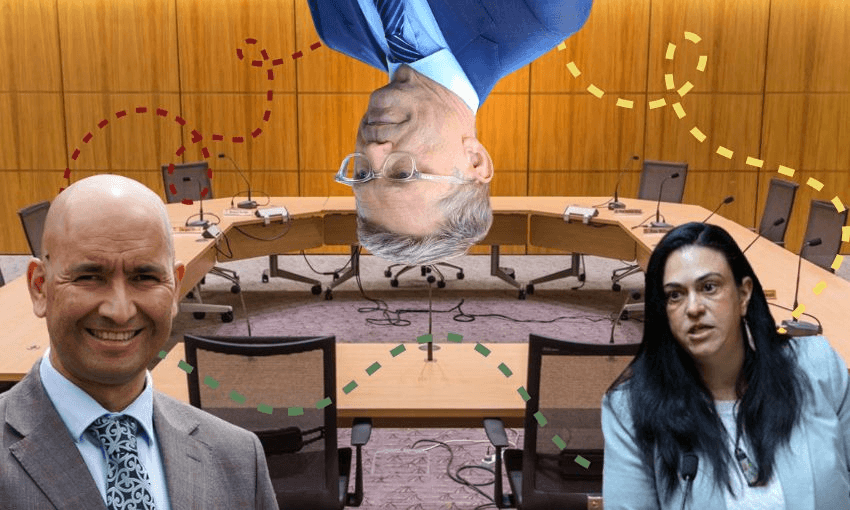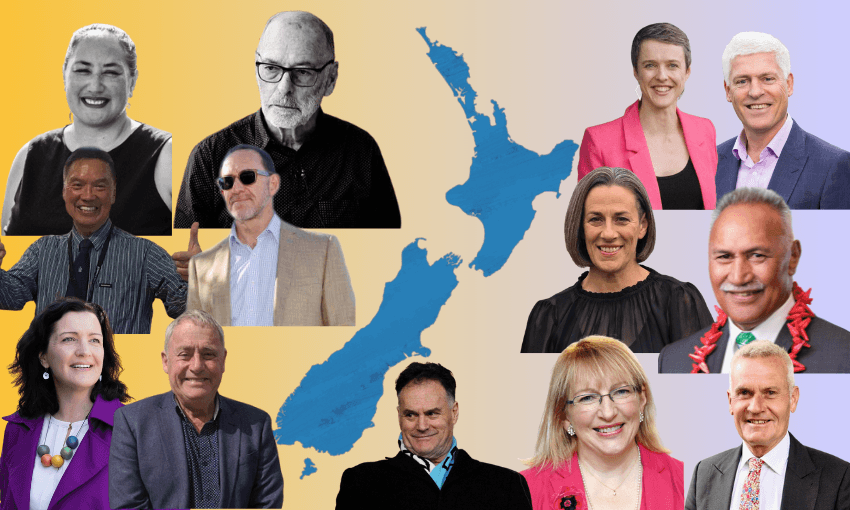The vibes were tense as ministers and officials got a grilling in the final two days of scrutiny week, where government spending is put under the microscope.
Read our recap of the first two days of scrutiny week here.
Health
The energy was testy, to say the least, when health minister Simeon Brown faced the health committee at Bowen House on Wednesday morning. More accurately, Brown faced off with former health minister and current Labour health spokesperson Ayesha Verrall, who caused a bit of a delay as things kicked off by attempting to move that the session be extended by 30 minutes (she was voted down on that), then that only the opposition could ask questions (again, she was voted down).
Verrall and Brown argued over deficits, medicines and bed shortages, and when they failed to see eye-to-eye, Brown would challenge her to “look in the mirror”. When Green MP Hūhana Lyndon asked why the minister had recently decided to repeal the health charter and sector principles in the Pae Ora (Healthy Futures) Act 2022, many of which are underpinned by obligations to the Treaty of Waitangi, Brown said the frameworks didn’t have enough focus on patient outcomes.
“If you look at those health sector principles, one of them is requiring the health system to deliver against climate change obligations,” Brown said. “We have a ministry for the environment for that. I want surgeries, not strategies.”
Oranga Tamariki
That tense atmosphere persisted all day. In select committee room 5, the social services and community committee gathered just before midday to hear from children’s minister Karen Chhour on Oranga Tamariki spending, but committee member Willow-Jean Prime ( Labour’s children’s spokesperson) was more keen to talk about the second preliminary youth boot camp evaluation released on Friday, and why the minister hadn’t bothered to send out a press release to let anyone know it existed.
“I don’t usually make it my personal job to pick up the phone and ring you,” Chhour told her.
It wasn’t an easy session for Chhour. Prime and Labour colleague Helen White grilled and heckled her over the boot camp pilot, the unrevealed reoffending rates and the fact that six of the nine rangatahi who went through the pilot were now in a youth justice facility. When committee chair Joseph Mooney attempted to turn the heat down by blocking Prime’s questions and asking her to be silent, Prime bit back at him, too. The constant hubbub was enough to make NZ First’s Tanya Unkovich snap “show some respect!”
But to her credit, Chhour was candid when she spoke about the grief experienced by these rangatahi following a death in the cohort, and how it “derailed some of these young people mentally”. Pilot lead Iain Chapman told the committee that reoffending rates were “not a sign of failure or success of a programme … it’s about trying something different for these young people” – but he couldn’t convince the opposition that the price tag and outcomes had been worth it.
Whānau Ora
The hearing into Whānau Ora’s spending was a funny one, considering two of the Māori affairs committee members (Labour’s Willie Jackson and Te Pāti Māori’s Takutai Tarsh Kemp) once had leadership roles in the Whānau Ora Commissioning Agency (WOCA). Though WOCA wasn’t the only agency to lose its Whānau Ora contract earlier this year, it was naturally at the forefront of many of the opposition’s questions.
Jackson, putting it “all on the table”, was reassured by both Māori development minister Tama Potaka and Te Puni Kōkiri chief executive Dave Samuels that neither cabinet nor any minister had a say in the Whānau Ora tender, nor was WOCA’s contract rescinded because its CEO, John Tamihere, is also the president of Te Pāti Māori.
After telling Labour’s Peeni Henare the Whānau Ora tender was “brown-clad”, in response to concerns mainstream providers could one day be favoured over Māori ones, Potaka only had “Oh! Ka pai!” to say to Kemp. She used the last few minutes of the hearing to lament the “waste of time” the changeover in contracts had been for providers – “we already had a commissioning agency that did that [navigator reporting and regulated outcomes], and there’s evidence for days to prove that, so your responses don’t make sense”.
“I don’t think there was a question,” Samuels responded.
Media
Broadcasting minister Paul Goldsmith had to assure the social services and community committee on Wednesday afternoon that it was “certainly not my expectation” that RNZ Concerts would be on the chopping block in light of recent cuts to RNZ’s funding. At the end of the day, “it’s ultimately up to the [RNZ] board”.
With that life-or-death matter out of the way, Goldsmith was free to confirm that he would be making progress on a domestic screen production rebate, had no commitment to regulating streaming platforms and, no, Winston Peters was not responsible for the aforementioned RNZ cuts. But he did have an inspirational message to the media industry: “Get out there and keep on hustling.”
There was a slight uproar at the end from Labour’s Reuben Davidson and Rachel Boyack, both of whom couldn’t believe committee chair Mooney called the hearing off with one minute to spare – precious grilling time, gone to waste. “Let’s just say we got shut down before our time,” Boyack complained.
“Like the media,” Davidson remarked.
Environment
Thursday morning in Bowen House was slightly awkward. Environment minister Penny Simmonds, RMA minister Chris Bishop and biosecurity minister Andrew Hoggard were gathered to talk about Vote Environment, and it didn’t take very long for one of the ministers to put their foot in it.
When Act MP Simon Court asked his party colleague Hoggard what should be done about Te Mana o Te Wai – a concept underpinning the National Policy Statement on Freshwater Management that recognises and upholds the health and mauri of water – the minister said the government needed to “balance things out” so that the “life force of the water” didn’t come ahead of economic growth (as promised in the Act-National coalition agreement). “There’s a whole range of spiritual concepts in [Te Mana o Te Wai] – what is the life force? As a Star Wars fan, when someone says ‘the life force’ I’m thinking, ‘what’s the midi-chlorian count?’”
“That was a joke,” Hoggard explained, to not a single laugh from the room.




